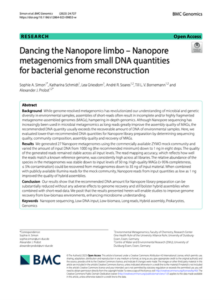On 01.12.23, a publication by UDE project members Prof. Dr. Alexander Probst and Sophie Simon on the application of nanopore sequencing with very small amounts of DNA was published in BMC Genomics.
Genome-resolving metagenomics has drastically changed our understanding of the ecological and genetic diversity of prokaryotes. Until now, DNA sequencing methods based on short reads (DNA fragments) have mainly been used for this purpose and often only lead to the reconstruction of incomplete genomes. This problem can be circumvented with nanopore sequencing, as the reads are many times longer than was previously the case and repetitive elements in a genome, for example, can also be reconstructed.
The amount of DNA recommended by the manufacturer (Oxford Nanopore Technologies) for nanopore sequencing is 1 µg. Obtaining this amount of DNA from samples of aquatic “MultiKulti-ecosystems” is often difficult, so in this study we used a DNA standard to gradually reduce the amount of DNA used down to 1 ng. Our results show that even 35 ng of DNA is sufficient to reconstruct high quality genomes. With the longer nanopore reads generated from only 1 ng of DNA, we were able to improve so-called “hybrid assemblies”, a combination of short and long DNA reads, compared to a pure assembly of short reads.
The results will help us in further research on aquatic ecosystems with low biomass and also multi-culti reactor monitoring.
Link to the paper: https://bmcgenomics.biomedcentral.com/articles/10.1186/s12864-023-09853-w

